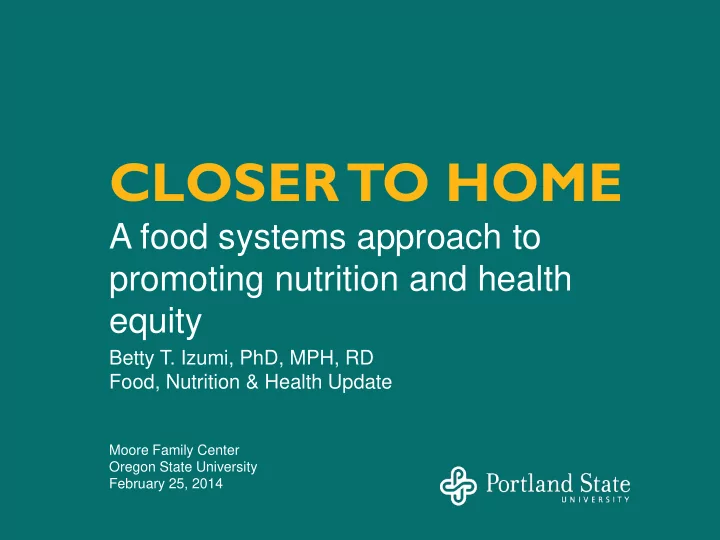

CLOSER TO HOME A food systems approach to promoting nutrition and health equity Betty T. Izumi, PhD, MPH, RD Food, Nutrition & Health Update Moore Family Center Oregon State University February 25, 2014
12.5 MILLION AMERICAN CHILDREN ARE OBESE. There are significant racial & ethnic disparities in obesity prevalence among children Ogden & Caroll, 2010
Poor diet is a major contributor of obesity.
Ecological MACRO Framework Brofenbrenner, 1979 PHYSICAL McLeory et al., 1988 Story et al., 2008 SOCIAL INDIVIDUAL
Food System Model Story, Hamm & Wallinga, 2009; Neff et al., 2009; Villarejo et al., 2010
Sustainability
Sustainability ENVIRONMENTAL SOCIAL ECONOMIC Dawe & Ryan, 2003; Magis & Shin, 2009
GOOD FOOD = HEALTHY, GREEN, FAIR & AFFORDABLE. W.K. Kellogg Foundation
Food preferences are formed early on in life.
13 million of the nation’s 21 million preschoolers in some form of regular non-parental care
1,045,000 children were enrolled in Head Start in 2012-2013
HARVEST for HEALTHY KIDS
Acknowledgements Cara Eckhardt, PhD , Dawn Barberis, EdD , Jennifer Hallman, BA , Amanda Peden, MPH , Brie Stott, MS , William Ries, MS , Sandy Nimz, BS, CFLE , Angela Capello, BS, Pam Greenough Corrie , MS Harvest for Healthy Kids Steering Committee PSU School of Community Health, Mt. Hood Community College Head Start & Early Head Start, OHSU, Dancing Roots Farm, Ecotrust, Food Services of America, Child Care Resource and Referral of Multnomah County Our funders Kaiser Permanente Northwest, Meyer Memorial Trust, Walmart Foundation
8 FEATURED FOODS Winter Squash Beets Cabbage Sweet Potatoes Berries Root Veggies Carrots Asparagus
Foodservice Component 2x PER WEEK MONDAY TUESDAY WEDNESDAY THURSDAY FRIDAY
Curriculum Development Izumi et al, (2013).
Classroom Education Components
Activity Plan
Picture Cards
Teacher Bites
Family Newsletter
Study Design HIGH-INTERVENTION BASELINE WILLINGNESS TO TRY LIKING LOW-INTERVENTION 8-months POST RECOGNITION WILLINGNESS TO TRY LIKING CONTROL
HIGH-INTERVENTION LOW-INTERVENTION Foodservice Modifications Foodservice Modifications Classroom Education
Methods Data Collection • Age-appropriate survey • Taste-test Data Analysis • Chi-square • Fisher’s exact test
Measures Recognition Willingness to try Liking
Baseline HIGH-INTERVENTION LOW-INTERVENTION CONTROL
Post-intervention HIGHER PROPORTION: Willingness to Try Liking Recognition HIGH-INTERVENTION LOW-INTERVENTION CONTROL
Post-intervention SQUASH CONTROL HIGH LOW p-value (n=79) (n=96) (n=123) Recognize 25 (20.0%) 13 (13.4%) 0.3 11 (13.9%) Try 88 (90.1%) 0.0 111 (88.1%) 59 (74.7%) 26 (44.1%) Like 33 (37.5%) 0.0 75 (70.8%)
Harvest for Healthy Kids had a positive impact on recognition, willingness to try, and liking.
Study Limitations Small sample size Lack of baseline recognition data Data collection challenges
Next Steps Dissemination New activity kits Early Head Start
THANK YOU
Recommend
More recommend